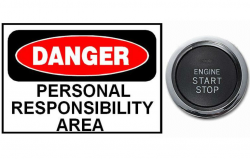
— Keyless ignition carbon monoxide deaths are the focus of a massive lawsuit filed against 10 of the largest automakers in the world. The lawsuit will try to provide answers to the following question: If a driver leaves a car engine running and walks away without shutting off the engine, whose fault is it the engine is still running?
The keyless ignition lawsuit was filed on behalf of 28 plaintiffs who claim over 5 million cars equipped with keyless ignitions are defective because people forget to turn off the engines before exiting the cars. Vehicles left running in enclosed areas create carbon monoxide that can quickly sicken and kill a human being or animal.
A keyless ignition system allows a driver to start the car by using a start/stop button on the instrument panel instead of inserting and turning a key in an ignition switch. However, the only way the car will start is if a keyless fob is detected in the car, such as in a purse or pocket. Although the keyless fob must be in the car for it to start, the fob doesn't need to be in the car to shut down the engine.
The keyless ignition lawsuit alleges a defect exists because the cars continue to run even after the keyless fob is no longer located in the car. Some keyless ignition cars beep the horn to alert drivers the engines are still running while other cars have an "auto-off" feature. However, the lawsuit alleges the cars with these safety measures are new vehicles, which leaves millions of older cars without the safety features.
The plaintiffs cite cases where drivers have mistakenly left vehicles running inside enclosed garages attached to homes. The build-up of carbon monoxide enters into homes and poisons anyone inside. According to the lawsuit, 13 people have died from carbon monoxide poisoning after accidentally forgetting to turn off the cars.
Some of the problem is caused by certain engines that can be nearly silent while running. This is especially true with hybrid cars that run on both electric and gasoline. If a car is running in electric mode and is left running, it's possible for the batteries to drain and cause the gasoline-powered engine to kick on. Carbon monoxide begins accumulating once the gas-powered engine begins.
Much of the case will determine how far automakers must go to "protect" car owners, compared to the personal responsibility of those car owners. An automaker can provide seat belts for protection, chimes and alarms warning the seat belt isn't being worn, but no automaker can force a driver to "buckle-up" their seat belt.
As long as the start/stop button is working properly, how far does an automaker have to go to guarantee a driver won't leave the car running in a garage?
Owners of cars with keyless ignitions have complained about the dangers of carbon monoxide poisoning, but the majority of complaints don't involve a known problem with the keyless ignitions. Instead, the complaints involve people who simply forgot to turn off their cars.
"On two recent occasions I parked my car and walked away without pushing the start/stop button. I did not realize what I did for two reasons: (1) the engine runs extremely quietly, (2) more importantly, I was not required to turn off the engine by turning the ignition key which is something that I have been doing almost subconsciously. On both occasions I did not come back until about half an hour later to discover that the engine was not turned off." - 2012 Toyota Camry owner / Acton, Massachusetts
"I drove this rental car and parked it inside my detached garage at 7:30 pm. I neglected to push the start/stop button upon exiting the car. Consequently, the car continued to run. At 10:30 pm, needing a tool, I went back and opened the garage door. A rush of hot air hit me in the face. To my horror, I realized that I did not shut the car off. Garage temperature had to be about 120 degrees. Who knows what could have happened, had the car run all night." - 2015 Nissan Altima owner / Cleveland Heights, Ohio
"This car is keyless which often results in the failure of their driver shutting off the engine which is at times parked inside an enclosed garage of a home. This occurred on three different occasions at my home. Thank god I had a carbon monoxide alarm in my home which alerted me of this problem." - 2008 Lexus LS 460 owner / Delray Beach, FL, USA
For its part, the National Highway Traffic Safety Administration (NHTSA) called keyless ignitions a safety problem in 2011 and suggested loud alarms to warn drivers when a car is left running. The proposal asked that an alarm be audible inside and outside the car, similar to the loudness of a smoke alarm. However, NHTSA never forced the proposal upon automakers.
This year General Motors recalled its Chevy Volt hybrid cars to add software to prevent the cars from continually running after the driver has left with the keyless fob. The Chevy Volt makes no engine noise when the car is running in "electric" mode and owners have drained the batteries after exiting the cars with the engine running in electric mode.
The gasoline engine will start once the battery has been drained while in electric mode. Parking the car in a confined space (like an attached garage) can cause carbon monoxide to build up and become dangerous in enclosed areas. GM says it knows of two people who suffered from carbon monoxide poisoning from this very scenario.
The keyless ignition / carbon monoxide lawsuit was filed in the U.S. District Court, Central District of California - Draeger et al v. Toyota Motor Sales USA Inc et al.
The plaintiffs are represented by Labaton Sucharow LLP, and Hagens Berman Sobol Shapiro LLP.




